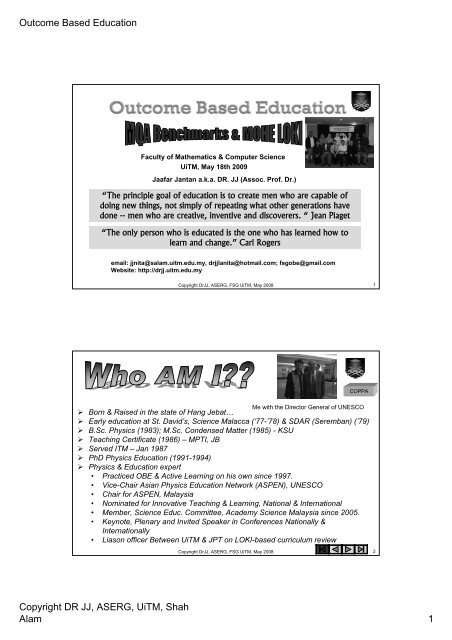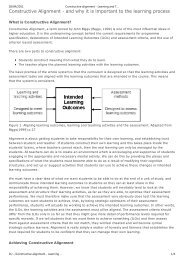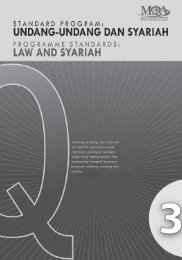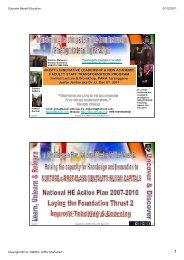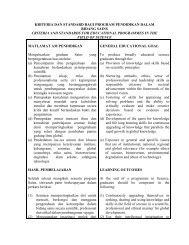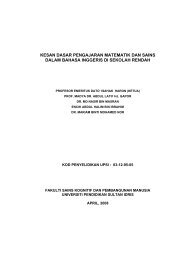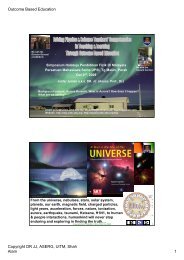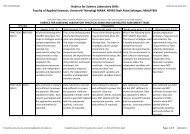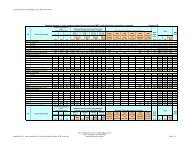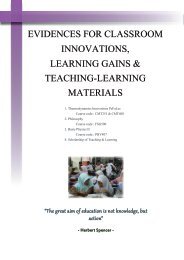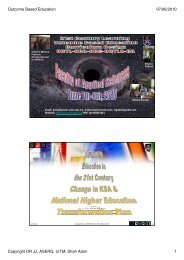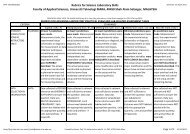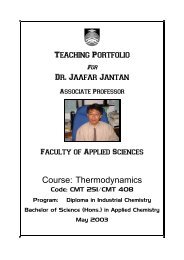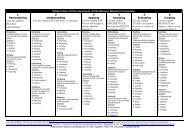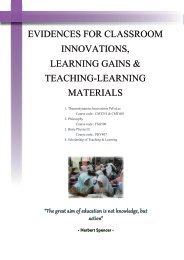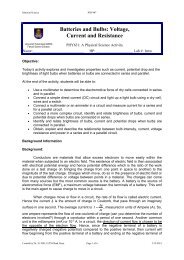DRJJ-fksm-Obe-180509 - UiTM
DRJJ-fksm-Obe-180509 - UiTM
DRJJ-fksm-Obe-180509 - UiTM
Create successful ePaper yourself
Turn your PDF publications into a flip-book with our unique Google optimized e-Paper software.
Outcome Based Education<br />
Faculty of Mathematics & Computer Science<br />
<strong>UiTM</strong>, May 18th 2009<br />
Jaafar Jantan a.k.a. DR. JJ (Assoc. Prof. Dr.)<br />
“The principle goal of education is to create men who are capable of<br />
doing new things, not simply of repeating what other generations have<br />
done -- men who are creative, inventive and discoverers. “ Jean Piaget<br />
“The only person who is educated is the one who has learned how to t<br />
learn and change.” Carl Rogers<br />
email: jjnita@salam.uitm.edu.my, drjjlanita@hotmail.com; fsgobe@gmail.com<br />
Website: http://drjj.uitm.edu.my<br />
Copyright DrJJ, ASERG, FSG <strong>UiTM</strong>, May 2008 1<br />
COPPA<br />
Me with the Director General of UNESCO<br />
‣ Born & Raised in the state of Hang Jebat…<br />
‣ Early education at St. David’s, Science Malacca (‘77-’78) & SDAR (Seremban) (’79)<br />
‣ B.Sc. Physics (1983); M.Sc. Condensed Matter (1985) - KSU<br />
‣ Teaching Certificate (1986) – MPTI, JB<br />
‣ Served ITM – Jan 1987<br />
‣ PhD Physics Education (1991-1994)<br />
‣ Physics & Education expert<br />
• Practiced OBE & Active Learning on his own since 1997.<br />
• Vice-Chair Asian Physics Education Network (ASPEN), UNESCO<br />
• Chair for ASPEN, Malaysia<br />
• Nominated for Innovative Teaching & Learning, National & International<br />
• Member, Science Educ. Committee, Academy Science Malaysia since 2005.<br />
• Keynote, Plenary and Invited Speaker in Conferences Nationally &<br />
Internationally<br />
• Liason officer Between <strong>UiTM</strong> & JPT on LOKI-based curriculum review<br />
Copyright DrJJ, ASERG, FSG <strong>UiTM</strong>, May 2008 2<br />
Copyright DR JJ, ASERG, <strong>UiTM</strong>, Shah<br />
Alam 1
Outcome Based Education<br />
Copyright DrJJ, ASERG, FSG <strong>UiTM</strong>, May 2008 3<br />
Copyright DrJJ, ASERG, FSG <strong>UiTM</strong>, May 2008 4<br />
Copyright DR JJ, ASERG, <strong>UiTM</strong>, Shah<br />
Alam 2
Outcome Based Education<br />
The 3 Domains of Educational Goals<br />
Cognitive<br />
The Head<br />
Affective<br />
The Heart<br />
Psychomotor<br />
The Hand<br />
3H<br />
Copyright DrJJ, ASERG, FSG <strong>UiTM</strong>, May 2008 5<br />
“We must produce confident students with a sense of balance<br />
and proportion. While an individual may specialise in a certain<br />
area, his or her perspective should be enriched by other<br />
experiences as well.”<br />
“The MOHE will thus introduce a holistic programme that will<br />
cut across all disciplines and focus on communication and<br />
entrepreneurial skills. The programme, which is intended to build<br />
a balanced perspective in all students, will expose them to<br />
subjects beyond their area of specialisation. For example, students<br />
reading for degrees in the sciences such as medicine, engineering<br />
and chemistry will be exposed to courses covering literature and<br />
philosophy. Likewise, students in the humanities will be exposed to<br />
the rudiments of science and technology, and certainly, ICT.”<br />
Source: NATIONAL HIGHER EDUCATION ACTION PLAN 2007-2010<br />
Copyright DR JJ, ASERG, <strong>UiTM</strong>, Shah<br />
Alam 3
Outcome Based Education<br />
MOHE’s Attributes of Human Capital with First-Class Mentality*.<br />
Knowledge Attributes:<br />
• Mastery of core subjects and<br />
ability to apply that knowledge<br />
• Mastery of Bahasa Malaysia and<br />
English, and at least one other<br />
global language.<br />
• A continuing passion for<br />
knowledge through lifelong<br />
learning.<br />
• Excellent general knowledge and<br />
interest in current events.<br />
Personal Attributes:<br />
• Goal-oriented: proactive,<br />
self-starting, selfdisciplined,<br />
confident,<br />
resilient, motivated, and<br />
fiercely competitive.<br />
• Intellectually engaging:<br />
creative, innovative, and<br />
possessing critical<br />
thinking skills.<br />
• Quick learner, adaptable,<br />
Interpersonal<br />
Attributes:<br />
• Able<br />
communicator<br />
and effective<br />
presenter.<br />
• Able to relate and<br />
be comfortable with<br />
people at all levels.<br />
• Able to develop and<br />
leverage on<br />
• Appreciation of the arts, culture<br />
and flexible.<br />
personal and<br />
and sports.<br />
• Entrepreneurial.<br />
professional<br />
• Ethically and morally upright. networks to achieve<br />
• Sound analytical and problemsolving<br />
skills.<br />
• Spiritually grounded.<br />
goals.<br />
• Natural leader.<br />
• Awareness of business and • Compassionate and caring<br />
management principles, and (through volunteerism and • Team player.<br />
technology.<br />
social services).<br />
Copyright DrJJ, ASERG, FSG <strong>UiTM</strong>, May 2008 7<br />
Copyright DR JJ, ASERG, <strong>UiTM</strong>, Shah<br />
Alam 4
Outcome Based Education<br />
Copyright DrJJ, ASERG, FSG <strong>UiTM</strong>, May 2008 9<br />
Copyright DrJJ, ASERG, FSG <strong>UiTM</strong>, May 2008 10<br />
Copyright DR JJ, ASERG, <strong>UiTM</strong>, Shah<br />
Alam 5
Outcome Based Education<br />
MESYUARAT SEMAKAN HASIL PEMBELAJARAN DAN<br />
KEMAHIRAN INSANIAH (LOKI) PROGRAM AKADEMIK IPTA<br />
PAN PACIFIC KLIA<br />
3 – 4 DISEMBER 2008<br />
BAHAGIAN PENGURUSAN PEMBANGUNAN<br />
AKADEMIK JABATAN PENGAJIAN TINGGI<br />
Copyright DrJJ, ASERG, FSG <strong>UiTM</strong>, May 2008 11<br />
Mengapa anda di sini<br />
• Bermula 1/1/2009 (2011), MQA akan membuat audit<br />
semakan untuk semua program di IPTA, samada yang<br />
baru atau yang lama.<br />
• JKPT pula akan fokus kepada semakan Hasil<br />
Pembelajaran, Taksonomi dan Kemahiran Insaniah.<br />
• Anda (PM Dr Roziah, Kiranjit & PM DrJJ) telah terpilih<br />
untuk menyalurkan maklumat dari mesyuarat ini<br />
kepada universiti masing-masing – Bertindak sebagai<br />
Liaison officer berkenaan LOKI di antara JPT dan<br />
IPTA masing-masing.<br />
Copyright DrJJ, ASERG, FSG <strong>UiTM</strong>, May 2008 12<br />
Copyright DR JJ, ASERG, <strong>UiTM</strong>, Shah<br />
Alam 6
Outcome Based Education<br />
Strategi #1 P&P: Menyemak kurikulum berteraskan<br />
attributes graduan berkualiti & berdaya saing<br />
Pelan Tindakan<br />
1.1.1 Menyebarluaskan kefahaman LO & KI<br />
di semua IPT<br />
1.1.2 Menyemak semua kurikulum<br />
berteraskan LO & KI<br />
Petunjuk Prestasi (KPI)<br />
100% TNC A&A & HEPA menguasai<br />
rekabentuk kurikulum berteraskan LO & KI.<br />
1 Prog/IPTA<br />
sehingga Dis 2008<br />
100% kurikulum disemak berteraskan LO &<br />
KI menjelang 2010<br />
1.1.3 Menjalankan keperluan pasaran<br />
berteraskan kajian halatuju prog &<br />
kebolehpasaran graduan<br />
100% program kritikal mempunyai kajian<br />
halatuju & model unjuran pasaran kerja<br />
menjelang Julai 2009<br />
1.1.4 Mendokumentasikan semua<br />
kurikulum<br />
100% kurikulum IPT dikelaskan sebagai<br />
dokumen kawalan di JPT menjelang 2010<br />
Copyright DrJJ, ASERG, FSG <strong>UiTM</strong>, May 2008 13<br />
Pelan tindakan P&P<br />
Copyright DrJJ, ASERG, FSG <strong>UiTM</strong>, May 2008 14<br />
Copyright DR JJ, ASERG, <strong>UiTM</strong>, Shah<br />
Alam 7
Outcome Based Education<br />
Keperluan JKPT<br />
• Memenuhi/mencapai PSPTN Teras Kedua – Menambahbaik Kualiti<br />
Pengajaran & Pembelajaran<br />
• Di akhir pengajian di IPTA, pelajar perlu memenuhi attributes/kriteria<br />
tertentu.. Yang telah dijanjikan kepada pelajar dalam Hasil<br />
Pembelajaran samada Program atau Kursus.<br />
• Kurikulum pengajian perlu diasaskan kepada kelebaran dan<br />
kedalaman yang sesuai i.e. breadth and depth<br />
• Breadth sesuatu program/kursus boleh dirangka melalui matriks Hasil<br />
Pembelajaran dan Kemahiran Insaniah<br />
• Depth sesuatu program/kursus boleh dirangka melalui matriks<br />
Taksonomi<br />
• Contoh Matriks ada disediakan, walau bagaimanapun terpulang<br />
kepada IPTA masing-masing untuk menyediakannya mengikut<br />
keperluan masing-masing, selagi boleh menyediakan perancangan<br />
dari segi kriteria pelajar, kelebaran dan kedalaman kurikulum.<br />
Copyright DrJJ, ASERG, FSG <strong>UiTM</strong>, May 2008 15<br />
Objektif semakan kurikulum<br />
PSPTN –<br />
Teras 2<br />
Pelajar<br />
cemerlang<br />
output<br />
Penyampaian kurikulum 3-4 tahun (Sarjana Muda)<br />
proses<br />
Matriks Hasil<br />
Pembelajaran<br />
Matriks<br />
Taksonomi<br />
Matriks<br />
Kemahiran Insaniah<br />
input<br />
Kriteria pelajar dan<br />
kelebaran program/kursus<br />
Kedalaman<br />
program/kursus<br />
Kelebaran<br />
program/kursus<br />
Copyright DrJJ, ASERG, FSG <strong>UiTM</strong>, May 2008 16<br />
Copyright DR JJ, ASERG, <strong>UiTM</strong>, Shah<br />
Alam 8
Outcome Based Education<br />
WAS<br />
1. Knowledge (K)<br />
2. Practical Skills (P)<br />
3. Social skills and responsibility<br />
(A)<br />
4. Values, attitudes and<br />
professionalism (A)<br />
5. Communication, leadership and<br />
team skills (P/A)<br />
6. Problem solving and scientific<br />
skills (K/P)<br />
7. Information management and<br />
lifelong learning skills(P/A)<br />
8. Managerial and entrepreneurial<br />
skills (K/P/A)<br />
IS<br />
1. Knowledge (K)<br />
2. Practical Skills (P)<br />
3. Thinking and scientific skills<br />
4. Communication skills<br />
5. Social skills, teamwork and<br />
responsibility<br />
6. Values, ethics, moral and<br />
professionalism (A)<br />
7. Information management and<br />
lifelong learning skills(P/A)<br />
8. Managerial and entrepreneurial<br />
skills (K/P/A)<br />
9. Leadership skills<br />
Copyright DrJJ, ASERG, FSG <strong>UiTM</strong>, May 2008 17<br />
1. Critical thinking and problem solving skills (P)<br />
2. Communication skills (P)<br />
3. Ethics and professionalism (A)<br />
4. Group working skills (A)<br />
5. Lifelong learning and information management (A)<br />
6. Entrepreneurship skills (P)<br />
7. Leadership skills (A)<br />
Copyright DrJJ, ASERG, FSG <strong>UiTM</strong>, May 2008 18<br />
Copyright DR JJ, ASERG, <strong>UiTM</strong>, Shah<br />
Alam 9
Outcome Based Education<br />
Copyright DrJJ, ASERG, FSG <strong>UiTM</strong>, May 2008 19<br />
MQA COPPA<br />
MQA COPIA<br />
Copyright DrJJ, ASERG, FSG <strong>UiTM</strong>, May 2008 20<br />
Copyright DR JJ, ASERG, <strong>UiTM</strong>, Shah<br />
Alam 10
Outcome Based Education<br />
To implement MQF as a reference point for Malaysian<br />
Qualifications<br />
To develop standards and criteria and all other relevant<br />
instruments as national references for the conferment of<br />
awards with the cooperation of stakeholders<br />
To assure quality of HEIs and programmes<br />
To accredit courses that fullfill the set criteria and standards<br />
To facilitate the recognition and articulation of qualifications<br />
To maintain the Malaysian Qualification Register (MQR)<br />
Copyright DrJJ, ASERG, FSG <strong>UiTM</strong>, May 2008 21<br />
Copyright DrJJ, ASERG, FSG <strong>UiTM</strong>, May 2008 22<br />
Copyright DR JJ, ASERG, <strong>UiTM</strong>, Shah<br />
Alam 11
Outcome Based Education<br />
1.1.1 Benchmarked Standards<br />
‣ The programme must define its aims, objectives and learning outcomes<br />
and make them known to its internal and external stakeholders.<br />
‣ The programme educational objectives (PEOs(<br />
PEOs) ) must reflect the key<br />
elements of the outcomes of higher education that are in line with<br />
national and global developments.<br />
‣ The programme aims, objectives and learning outcomes must be<br />
developed in consultation with principal stakeholders which should include<br />
the academic staff.<br />
‣ The programme aims, objectives and learning outcomes must be<br />
consistent with, and supportive of, the HEP’s vision and mission.<br />
Copyright DrJJ, ASERG, FSG <strong>UiTM</strong>, May 2008 23<br />
1.2.1 Benchmarked Standards (Learning Outcomes - POs)<br />
‣ The programme must define the competencies that the student should<br />
demonstrate on completion of the programme that cover mastery of<br />
body of knowledge; practical skills; social skills and responsibilities;<br />
ilities;<br />
values, attitudes and professionalism; problem solving and scientific<br />
skills; communication, leadership and team skills; information<br />
management and lifelong learning skills; and managerial and<br />
entrepreneurial skills.<br />
‣ The programme must demonstrate how the component modules contribute<br />
to the fulfillment of the programme’s learning outcomes.<br />
‣ The programme must show how the student is able to demonstrate the<br />
learning outcomes, for example, through summative assessments.<br />
Copyright DrJJ, ASERG, FSG <strong>UiTM</strong>, May 2008 24<br />
Copyright DR JJ, ASERG, <strong>UiTM</strong>, Shah<br />
Alam 12
Outcome Based Education<br />
Learning Outcomes<br />
At the end of this session, participants will be able to:<br />
1. Explain and discuss the MQA benchmark standards for Program<br />
Educational Objectives and Program Outcomes.<br />
2. Verbally state and explain the concepts used in Outcome-Based-<br />
Education (OBE).<br />
3. Discuss the meaning of OBE and apply the meaning to the<br />
different levels of curriculum design.<br />
4. Produce a set of Program Educational Objectives (PEO’s)<br />
• employability attributes<br />
5. Produce a set of Program Outcomes (PO’s)<br />
• competencies upon completion of program<br />
6. Justify and agree on the PEO’s and PO’s.<br />
Copyright DrJJ, ASERG, FSG <strong>UiTM</strong>, May 2008 25<br />
Learning Outcomes<br />
At the end of day this session, participants will confidently be<br />
able to:<br />
7. Develop the PO’s-PEO’s matrix and the PO’s-MOHE-SS-matrix.<br />
8. Develop the Course-PO-PEO-LO matrix.<br />
9. Develop the Course-Taxonomy matrix<br />
10.Generate the % of courses vs. Depth of taxonomy for the<br />
Cognitive, Psychomotor and Affective Domains respectively.<br />
11.Develop Course (CLO) & Subject (SLO or LLO) outcomes for a<br />
course.<br />
12.Produce the SLT table for a course & for a program.<br />
Copyright DrJJ, ASERG, FSG <strong>UiTM</strong>, May 2008 26<br />
Copyright DR JJ, ASERG, <strong>UiTM</strong>, Shah<br />
Alam 13
Outcome Based Education<br />
‣The result or consequence of a performance (in terms of success and<br />
failure).<br />
‣the way a thing turns out; a consequence<br />
The outcome of my discussion with PM Dr Rokiah<br />
is…<br />
Upon the completion of the Management<br />
Mathematics program at <strong>UiTM</strong>, bumiputra graduates<br />
will be able to ……<br />
Upon completion of this talk, we will be able produce<br />
a concept map to answer the question “What is<br />
OBE”….<br />
Copyright DrJJ, ASERG, FSG <strong>UiTM</strong>, May 2008 27<br />
What is a Program/Course/Lesson Outcome<br />
A statement of what students will be able to do when they have<br />
completed the program/course/lesson and it involves graduate's<br />
skills and knowledge that arise from the educational activities of<br />
the program/course/lesson which lead to the achievement of the<br />
Program Objectives<br />
An outcome has three major components:<br />
‣A description of what the students will be able to do<br />
‣The conditions under which the students will perform the task.<br />
‣The criteria for evaluating students’ performance.<br />
Copyright DrJJ, ASERG, FSG <strong>UiTM</strong>, May 2008 28<br />
Copyright DR JJ, ASERG, <strong>UiTM</strong>, Shah<br />
Alam 14
Outcome Based Education<br />
An outcome at the course level<br />
condition<br />
Action<br />
Observable<br />
Measurable<br />
Criteria<br />
At the end of this activity,<br />
you will be able to write at least 4 attributes of your graduates<br />
for the program you are reviewing.<br />
Copyright DrJJ, ASERG, FSG <strong>UiTM</strong>, May 2008 29<br />
Copyright DrJJ, ASERG, FSG <strong>UiTM</strong>, May 2008 30<br />
Copyright DR JJ, ASERG, <strong>UiTM</strong>, Shah<br />
Alam 15
Outcome Based Education<br />
General (not<br />
measurable)<br />
MOHE<br />
Institutional Attributes<br />
Program level (Still general)<br />
Very general attributes<br />
(not measurable)<br />
General (not<br />
measurable)<br />
Course Level (Specific but not measurable)<br />
Lesson Level (Very specific & MUST be measurable)<br />
Copyright DrJJ, ASERG, FSG <strong>UiTM</strong>, May 2008 31<br />
Must include<br />
views of<br />
stakeholders<br />
Curriculum<br />
Vision<br />
& Mission<br />
Program<br />
Educational Objectives<br />
Program Outcomes<br />
PO-LOKI<br />
Course Structure (select courses to address POs)<br />
Course Outcomes (COs)<br />
Course syllabus (selection of content) + delivery methods<br />
Assessment (Measuring the achievement of COs & POs)<br />
Evaluation (Continuous Quality Improvement-CQI)<br />
stakeholders<br />
-students,<br />
faculty,<br />
alumni,<br />
employers of<br />
program<br />
graduates,<br />
and funding<br />
sources<br />
Curriculum<br />
Copyright DrJJ, ASERG, FSG <strong>UiTM</strong>, May 2008 32<br />
Copyright DR JJ, ASERG, <strong>UiTM</strong>, Shah<br />
Alam 16
Outcome Based Education<br />
‣<strong>UiTM</strong>’s VISION (2006)<br />
‣To establish <strong>UiTM</strong> as a premiere university of outstanding scholarship<br />
and academic excellence capable of providing leadership to Bumiputera’s<br />
dynamic involvement in all professional fields of world-class standards in<br />
order to produce globally<br />
‣<strong>UiTM</strong>’s PHILOSOPHY (2006)<br />
‣A believe that every individual has the ability to attain excellence through<br />
the transfer of knowledge and the assimilation of moral values so as to<br />
become professional graduates capable of developing knowledge, self,<br />
society and the nation.<br />
Copyright DrJJ, ASERG, FSG <strong>UiTM</strong>, May 2008 33<br />
<strong>UiTM</strong>’s MISSION (2006)<br />
‣To enhance the knowledge and expertise of Bumiputera’s in all fields of<br />
study through professional programmes, research work and community<br />
service based on moral values and professional ethics<br />
Copyright DrJJ, ASERG, FSG <strong>UiTM</strong>, May 2008 34<br />
Copyright DR JJ, ASERG, <strong>UiTM</strong>, Shah<br />
Alam 17
Outcome Based Education<br />
<strong>UiTM</strong>: Produce the Human Capital<br />
Knowledgeable<br />
Skillful<br />
Creative<br />
Critical<br />
Analytical<br />
Scientific<br />
Competitive<br />
Proactive<br />
Mentally strong<br />
Excellent Persona<br />
Ethical<br />
Religiousconscious<br />
Independent<br />
High morals<br />
Sensitive<br />
Copyright DrJJ, ASERG, FSG <strong>UiTM</strong>, May 2008 35<br />
CMAP-S<br />
CMAP-S-Q<br />
CMAP-EDU<br />
CMAP-EDU-Q<br />
CMAP-A<br />
CMAP-A-Q<br />
CMAP-M<br />
Copyright DrJJ, ASERG, FSG <strong>UiTM</strong>, May 2008 36<br />
Copyright DR JJ, ASERG, <strong>UiTM</strong>, Shah<br />
Alam 18
Outcome Based Education<br />
Copyright DrJJ, ASERG, FSG <strong>UiTM</strong>, May 2008 37<br />
OBE is a method of curriculum design and teaching that<br />
focuses on what students can actually do after they are<br />
taught. OBE addresses the key questions as:<br />
‣Why do you want them to learn it – Vision, Mission, PEOs, , POs<br />
‣What do you want the students to learn – course structure, syllabus<br />
‣How can you best help students learn it – Learning Activities<br />
‣How will you know what they have learnt - Assessment<br />
Copyright DrJJ, ASERG, FSG <strong>UiTM</strong>, May 2008 38<br />
Copyright DR JJ, ASERG, <strong>UiTM</strong>, Shah<br />
Alam 19
Outcome Based Education<br />
Towers (1996) listed four points to the OBE system that are<br />
necessary to make it work:<br />
a) What the student is to learn must be clearly identified.<br />
b) The student’s progress is based on demonstrated achievement.<br />
c) Multiple instructional and assessment strategies need to be<br />
available to meet the needs of each student.<br />
d) Adequate time and assistance need to be provided so that<br />
each student can reach the maximum potential.<br />
Copyright DrJJ, ASERG, FSG <strong>UiTM</strong>, May 2008 39<br />
OBE’s instructional planning process is a reverse of that associated<br />
with traditional educational planning.<br />
The desired outcome is selected first and the curriculum,<br />
instructional materials and assessments are created to support<br />
the intended outcome (Spady 1988; 1993).<br />
All curriculum and teaching decisions are made based on how<br />
best to facilitate the desired final outcome.<br />
Copyright DrJJ, ASERG, FSG <strong>UiTM</strong>, May 2008 40<br />
Copyright DR JJ, ASERG, <strong>UiTM</strong>, Shah<br />
Alam 20
Outcome Based Education<br />
OBE is able to measure—‘what the students are capable of doing’<br />
OBE goes beyond ‘structured tasks’ (e.g. memorization)<br />
OBE demands that students demonstrate his/her skills through<br />
more challenging tasks like writing project proposals and completing<br />
the projects, analyzing case studies and giving case presentations etc.<br />
Such exercises require students to practice and demonstrate their<br />
ability to think, question, research, make decisions and give<br />
presentations.<br />
Copyright DrJJ, ASERG, FSG <strong>UiTM</strong>, May 2008 41<br />
OBE involves students in a complete course of learning,<br />
developing their skills in designing to completing a whole process<br />
(Spady, 1994a, 1995).<br />
OBE also identifies higher levels of thinking (e.g. creativity, ability<br />
to analyze and synthesize information, ability to plan and organize<br />
tasks). Such skills are emphasized especially when students are<br />
assigned to organize and work as a community or entrepreneurial<br />
service teams to propose solutions to problems and market their<br />
solutions.<br />
Copyright DrJJ, ASERG, FSG <strong>UiTM</strong>, May 2008 42<br />
Copyright DR JJ, ASERG, <strong>UiTM</strong>, Shah<br />
Alam 21
Outcome Based Education<br />
1. Clarity of focus about outcomes<br />
‣Always have the significant, culminating exit outcomes as the<br />
focus.<br />
‣Let the students know what they are aiming for.<br />
2. Designing backwards<br />
‣Design curriculum backward by using the major outcomes as<br />
the focus and linking all planning, teaching and assessment<br />
decisions directly to these outcomes<br />
Copyright DrJJ, ASERG, FSG <strong>UiTM</strong>, May 2008 43<br />
3. Consistent, high expectations of success<br />
‣Set the expectation that OBE is for ALL learners.<br />
‣Expect students to succeed by providing them encouragement to<br />
engage deeply with the issues they are learning and to achieve the<br />
high challenging standard set (Spady, 1994b).<br />
4. Expanded opportunity<br />
‣Develop curriculum to give scope to every learner to learn in<br />
his/her own pace.<br />
‣Cater for individual needs and differences, for example,<br />
expansion of available time and resources so that all students<br />
succeed in reaching the exit outcomes.<br />
Copyright DrJJ, ASERG, FSG <strong>UiTM</strong>, May 2008 44<br />
Copyright DR JJ, ASERG, <strong>UiTM</strong>, Shah<br />
Alam 22
Outcome Based Education<br />
MQF<br />
Copyright DrJJ, ASERG, FSG <strong>UiTM</strong>, May 2008 45<br />
MQF Framework for University Preparatory level-Outcomes<br />
MQF<br />
Copyright DrJJ, ASERG, FSG <strong>UiTM</strong>, May 2008 46<br />
Copyright DR JJ, ASERG, <strong>UiTM</strong>, Shah<br />
Alam 23
Outcome Based Education<br />
MQF Framework for Preparatory level-Outcomes<br />
Knowledge & Comprehension<br />
• basic concepts of the relevant academic disciplines that enable<br />
students to enter Arts or Science based university courses<br />
Intellectual Skills<br />
• skills of the different approaches to solving problems<br />
Psychomotor Skills<br />
• basic laboratory skills, project work, group work and field activities.<br />
Generic Skills<br />
• communicate accurately, effective use of ICT<br />
• Some exercise of personal responsibility<br />
MQF<br />
Copyright DrJJ, ASERG, FSG <strong>UiTM</strong>, May 2008 47<br />
MQF Framework for Diploma level-Outcomes<br />
MQF<br />
Copyright DrJJ, ASERG, FSG <strong>UiTM</strong>, May 2008 48<br />
Copyright DR JJ, ASERG, <strong>UiTM</strong>, Shah<br />
Alam 24
Outcome Based Education<br />
MQF Framework for Diploma level-Outcomes<br />
MQF<br />
Knowledge & Comprehension<br />
• breadth, depth and complexity of knowledge for complex skills (degree of<br />
emphasis on breadth as against depth of knowledge may vary between<br />
qualifications granted at this level)<br />
Intellectual Skills<br />
• substantial degree of judgment for problem solving<br />
Psychomotor Skills<br />
• perform a broad range of complex technical operations<br />
Generic Skills<br />
• Communication & participation in teams<br />
• Exercise responsibility and substantial autonomy for own continuing<br />
learning Some exercise of personal responsibility<br />
• work related attitudes and ethics shown in exercise of responsibility and<br />
substantial autonomy for own output in work and responsibility for the work<br />
of others<br />
Copyright DrJJ, ASERG, FSG <strong>UiTM</strong>, May 2008 49<br />
MQF – Bachelors degree (Hons.)<br />
MQF<br />
Copyright DrJJ, ASERG, FSG <strong>UiTM</strong>, May 2008 50<br />
Copyright DR JJ, ASERG, <strong>UiTM</strong>, Shah<br />
Alam 25
Outcome Based Education<br />
MQF Framework for Degree level-Outcomes<br />
Knowledge & Comprehension<br />
• systematic and coherent body of complex knowledge, some of it at the<br />
boundaries of an academic discipline<br />
• major studies in which significant literature is available. Course content is<br />
taken to a significant depth and progressively developed to a high level<br />
which provides a basis for postgraduate study and professional careers.<br />
Intellectual Skills<br />
• analytical techniques and problem solving skills that can be applied in many<br />
types of employment, including in a professional<br />
MQF<br />
Copyright DrJJ, ASERG, FSG <strong>UiTM</strong>, May 2008 51<br />
MQF Framework for Degree level-Outcomes<br />
Psychomotor Skills<br />
• Practical skills relevant to the discipline<br />
Generic Skills<br />
• communicate effectively.<br />
• interpersonal and team skills appropriate for employment<br />
• prepared to undertake research, comprehend and evaluate new<br />
information and concepts from a range of sources, weigh evidence,<br />
arguments and assumptions, to reach sound judgments,<br />
• have developed a foundation for self-directed and life long learning<br />
• exercise of substantial personal responsibility and decision-making in<br />
complex and unpredictable circumstances.<br />
• Observation of professional ethics<br />
MQF<br />
Copyright DrJJ, ASERG, FSG <strong>UiTM</strong>, May 2008 52<br />
Copyright DR JJ, ASERG, <strong>UiTM</strong>, Shah<br />
Alam 26
Outcome Based Education<br />
MQF – Masters Degree<br />
MQF<br />
Copyright DrJJ, ASERG, FSG <strong>UiTM</strong>, May 2008 53<br />
MQF – Doctoral<br />
MQF<br />
Copyright DrJJ, ASERG, FSG <strong>UiTM</strong>, May 2008 54<br />
Copyright DR JJ, ASERG, <strong>UiTM</strong>, Shah<br />
Alam 27
Outcome Based Education<br />
LOKI GUIDE<br />
Copyright DrJJ, ASERG, FSG <strong>UiTM</strong>, May 2008 55<br />
INVOLVES KNOWLEDGE AND<br />
THE DEVELOPMENT OF<br />
INTELLECTUAL SKILLS<br />
lower order<br />
Higher order<br />
Copyright DrJJ, ASERG, FSG <strong>UiTM</strong>, May 2008 56<br />
Copyright DR JJ, ASERG, <strong>UiTM</strong>, Shah<br />
Alam 28
Outcome Based Education<br />
PSYCHOMOTOR DOMAIN INCLUDES PHYSICAL<br />
MOVEMENT, COORDINATION & USE OF THE<br />
MOTOR SKILL AREAS<br />
lower order<br />
Higher order<br />
Copyright DrJJ, ASERG, FSG <strong>UiTM</strong>, May 2008 57<br />
AFFECTIVE DOMAIN INCLUDES MANNER WE DEAL WITH<br />
THINGS EMOTIONALLY (e.g. FEELINGS, INTERESTS,<br />
ATTITUDES, APPRECIATION, ENTHUSIASMS,<br />
MOTIVATIONS) - THAT MIGHT RESULT FROM<br />
INSTRUCTION)<br />
CMAP-S<br />
CMAP-M<br />
CMAP-A<br />
Higher order<br />
lower order<br />
Copyright DrJJ, ASERG, FSG <strong>UiTM</strong>, May 2008 58<br />
Copyright DR JJ, ASERG, <strong>UiTM</strong>, Shah<br />
Alam 29
Outcome Based Education<br />
COURSE: PHY407<br />
Course Outcomes: Upon completion of this course, students will be able to:<br />
1. State, write and explain the concepts, laws and theories in electrostatics,<br />
electricity, magnetism, introductory atomic physics and modern physics.<br />
(C-Knowledge) (PO1)<br />
2. Verbally, visually (pictures & graphs) and algebraically relate and<br />
discuss the concepts, laws and theories in electrostatics, electricity,<br />
magnetism, introductory atomic physics and modern physics. (C-<br />
Comprehension) (PO1, PO6)<br />
3. Verify, assess & employ the concepts, laws and theories in<br />
electrostatics, electricity, magnetism, light, introductory atomic physics<br />
and modern physics to solve qualitative & quantitative problems visually,<br />
algebraically and occasionally, numerically. (C-Application) (PO1)<br />
Copyright DrJJ, ASERG, FSG <strong>UiTM</strong>, May 2008 59<br />
COURSE: PHY407; Course Outcomes: cont…<br />
4. Analyze, summarize and discuss solution to real world problems<br />
associated with electrostatics, electricity, magnetism, introductory atomic<br />
physics and modern physics. (for 3 rd year course only) (PO1, 6, 8)<br />
5. Observe, formulate, plan, conduct, and report scientific investigations in<br />
areas of electrostatics and electricity. (PO2, 3, 6)<br />
6. Verbally justify and convince peers and the facilitator, their rationale for<br />
the choice of methods, their ability to use and manipulate equipments, the<br />
need to transform raw scores into tabular and graphical forms and their<br />
ability to explain and interpret results of their investigation in areas of<br />
electrostatics and electricity. (PO2, 3, 7)<br />
7. Collaborate, motivate and truthful with team members and with<br />
facilitators in both the labs and in the classroom. (PO5, 8)<br />
Copyright DrJJ, ASERG, FSG <strong>UiTM</strong>, May 2008 60<br />
Copyright DR JJ, ASERG, <strong>UiTM</strong>, Shah<br />
Alam 30
Outcome Based Education<br />
COURSE: FSG500F<br />
SG500-Philosophy of Science<br />
1. Identify their learning preferences, attitudes towards science and<br />
conceptual understanding in their field of study.<br />
2. Define truth, beliefs and knowledge and justify their own belief about<br />
science knowledge in chemistry or physics through conceptual<br />
inventories.<br />
3. Apply the philosophical approach in analyzing and justifying the<br />
scientific methods, principles, laws and theories about the natural<br />
world.<br />
4. Identify their science reasoning skills.<br />
5. Argue and justify their opinion on issues in philosophy of science<br />
6. Critically write an original 3000 words position paper in favor or<br />
against issues on science that concern ethics and morality.<br />
Copyright DrJJ, ASERG, FSG <strong>UiTM</strong>, May 2008 61<br />
At the end of this activity students will be able to:<br />
1. Draw the electric force exerted by one point charge onto<br />
another and describe the motion of charges in the<br />
presence of other point charges.<br />
2. Describe the cause of motion between point charges.<br />
3. Describe and produce a model of the force in terms of the<br />
strength and direction that are acting on and by a point<br />
charge and on and by many point charges.<br />
Copyright DrJJ, ASERG, FSG <strong>UiTM</strong>, May 2008 62<br />
Copyright DR JJ, ASERG, <strong>UiTM</strong>, Shah<br />
Alam 31
Outcome Based Education<br />
At the end of this activity students will be able to:<br />
4. Describe and draw the electric field patterns created by<br />
point charges surrounding a point charge.<br />
5. Describe and draw the electric field patterns surrounding<br />
two like point charges and two unlike point charges.<br />
6. Measure the strength of an electric field produced by a<br />
point charge at various localities and produce a<br />
mathematical model of the strength.<br />
Copyright DrJJ, ASERG, FSG <strong>UiTM</strong>, May 2008 63<br />
Copyright DrJJ, ASERG, FSG <strong>UiTM</strong>, April 2008<br />
64<br />
Copyright DR JJ, ASERG, <strong>UiTM</strong>, Shah<br />
Alam 32
Outcome Based Education<br />
How Does MQF Affect Teaching-Learning<br />
65<br />
Teacher - centered<br />
Student - centered<br />
Course<br />
Objective is<br />
the<br />
Learning<br />
Target<br />
No mapping<br />
of learning<br />
outcomes<br />
Learning<br />
Outcomes is<br />
the Learning<br />
Target<br />
Mapping of<br />
learning<br />
outcomes<br />
necessary<br />
Student<br />
Independent<br />
Learning<br />
Not Calculated<br />
Contact hours<br />
Reflects Credit<br />
value<br />
Student<br />
independent<br />
Learning Time<br />
Calculated<br />
Total SLT reflects<br />
Credit value<br />
MQF.Roz.Roadshow<br />
MQF in Programmes.Roz.Roadshow<br />
Lecturer-Centred to Student-Centred<br />
(incorporating SLT)<br />
66<br />
Academic Activity<br />
(some examples)<br />
Face 2<br />
Face<br />
Student Self-<br />
Learning*<br />
Total<br />
1 Lecture 1 2 3<br />
2 Tutorial 1 2 3<br />
3 Laboratory/Practical 3 2 5<br />
4 Assignment - 2000 words 0 20 20<br />
5 Presentation 1 4 5<br />
Total 6 30 36<br />
Unaccounted for<br />
in the present system<br />
* Using the Proposed student independent learning in relation (Slide MQF.Roz.Roadshow<br />
17)<br />
MQF in Programmes.Roz.Roadshow<br />
Copyright DR JJ, ASERG, <strong>UiTM</strong>, Shah<br />
Alam 33
Outcome Based Education<br />
67<br />
A credit the agreed-upon value used to measure a student<br />
workload in terms of learning time required to complete<br />
course units, resulting in learning outcomes’ (UNESCO, 2004)<br />
Credit =<br />
the measurement of<br />
students’<br />
academic load<br />
Teaching Learning<br />
Activities<br />
Achievement of Learning Outcomes<br />
Teaching/Learning + Assessment<br />
e.g. 4 800 notional SLT = 120 credits<br />
Total SLT 40 Credit<br />
Student Learning Time (SLT)<br />
MQF in Programmes.Roz.Roadshow<br />
MQF.Roz.Roadshow<br />
Factors In Calculating Credit<br />
68<br />
Face to Face / Guided Learning Time<br />
+<br />
Student Self Learning Time<br />
+<br />
Total Assessment Time<br />
MQF in Programmes.Roz.Roadshow<br />
MQF.Roz.Roadshow<br />
Copyright DR JJ, ASERG, <strong>UiTM</strong>, Shah<br />
Alam 34
Outcome Based Education<br />
Student Categories &130 credit Bachelors<br />
69<br />
MQF in Programmes.Roz.Roadshow<br />
MQF.Roz.Roadshow<br />
Proposed student independent learning time<br />
70<br />
Item<br />
Duration (hours) or<br />
requirements<br />
Proposed Student Self<br />
Learning Time (hours)<br />
Lecture 1 1-2<br />
Tutorial 1 1-2<br />
Tutorial (involving case studies) 1 3<br />
Laboratory (including report writing) 3 2-3<br />
Undergraduate Final Year Project/ Dissertation 6 - 10 credits 200 - 400<br />
Studio Work 2 2<br />
Presentation 1 3-4<br />
Coursework/Assignment 2000 words 10 - 12<br />
Creative Writing (or a project that last a whole<br />
semester)<br />
100 – 150 pages 8-10<br />
Examination 3 10 – 20*<br />
Source: Bengkel Kebangsaan Pemantapan Sistem Kredit MQF, 31 Jan. – 2 Feb. 2005 by Quality Assurance Division, Ministry of<br />
Higher Education (Malaysia).<br />
* Proposed by MQA, depending on the field of study and the intensity of the examination.<br />
MQF in Programmes.Roz.Roadshow<br />
MQF.Roz.Roadshow<br />
Copyright DR JJ, ASERG, <strong>UiTM</strong>, Shah<br />
Alam 35
Outcome Based Education<br />
Learning Outcomes and Student Learning Time<br />
(A subject with 6 learning outcomes and 1.5 credit hours)<br />
71<br />
Learning Outcomes Lecture Tute Self -<br />
learning<br />
1 explain the types of contracts; 2 1 3 6<br />
2 distinguish between offer, acceptance and an invitation to 3 2 5 10<br />
treat;<br />
3 differentiate the types considerations; 2 1 3 6<br />
4 describe the principles concerning termination and breach of 4 2 4 10<br />
contract;<br />
5 Summarise principles of damages; 2 1 3 6<br />
6 Examine, analyse, compile, apply and justify the principles 0 3 6 9<br />
of contract in given scenario.<br />
- Assessment<br />
(1 coursework and one 3-hour examinations)<br />
0 4 12 16<br />
Total<br />
SLT<br />
Total 63<br />
MQF in Programmes.Roz.Roadshow<br />
MQF.Roz.Roadshow<br />
Module Academic Load & Credits<br />
72<br />
Learning Activities<br />
SLT<br />
(in hours)<br />
1 Lectures (54)<br />
a Attending Lectures 24<br />
b Pre and Post preparation* 30<br />
2 Tutorial (18)<br />
a Attending tutorial 9<br />
b Preparation for tutorial* 9<br />
3 Laboratory (36)<br />
a Practical 24<br />
b Prepreparation and Report writing* 12<br />
Learning Activities<br />
SLT<br />
(in hours)<br />
4 Assessments (23)<br />
a<br />
.<br />
b<br />
.<br />
1 continuos assessement (1 hour + 3 hours<br />
preparation*)<br />
1 presentation (1 hour + 5 hours<br />
preparation*)<br />
c. 1 Final Examination (3 hour + 10 hours<br />
preparation*)<br />
4<br />
6<br />
13<br />
Total 131<br />
Subject Credit (131 ÷ 40 = 3.27) 3<br />
* See Proposed student independent learning in relation (Slide 17)<br />
MQF in Programmes.Roz.Roadshow<br />
MQF.Roz.Roadshow<br />
Copyright DR JJ, ASERG, <strong>UiTM</strong>, Shah<br />
Alam 36
Outcome Based Education<br />
Credits per semester<br />
73<br />
AS201 AS231 PHY407 FSG500<br />
MQF in Programmes.Roz.Roadshow<br />
MQF.Roz.Roadshow<br />
Copyright DrJJ, ASERG, FSG <strong>UiTM</strong>, April 2008<br />
74<br />
Copyright DR JJ, ASERG, <strong>UiTM</strong>, Shah<br />
Alam 37
Outcome Based Education<br />
COURSE: PHY407<br />
Course Outcomes: Upon completion of this course, students will be able to:<br />
1. State, write and explain the concepts, laws and theories in electrostatics,<br />
electricity, magnetism, introductory atomic physics and modern physics.<br />
(C-Knowledge) (PO1)<br />
2. Verbally, visually (pictures & graphs) and algebraically relate and<br />
discuss the concepts, laws and theories in electrostatics, electricity,<br />
magnetism, introductory atomic physics and modern physics. (C-<br />
Comprehension) (PO1, PO6)<br />
3. Verify, assess & employ the concepts, laws and theories in<br />
electrostatics, electricity, magnetism, light, introductory atomic physics<br />
and modern physics to solve qualitative & quantitative problems visually,<br />
algebraically and occasionally, numerically. (C-Application) (PO1)<br />
MOE-Chem MOE-Bio MOE-Phys<br />
Copyright DrJJ, ASERG, FSG <strong>UiTM</strong>, April 2008<br />
75<br />
COURSE: PHY407; Course Outcomes: cont…<br />
4. Analyze, summarize and discuss solution to real world problems<br />
associated with electrostatics, electricity, magnetism, introductory atomic<br />
physics and modern physics. (for 3 rd year course only) (PO1, 6, 8)<br />
5. Observe, formulate, plan, conduct, and report scientific investigations in<br />
areas of electrostatics and electricity. (PO2, 3, 6)<br />
6. Verbally justify and convince peers and the facilitator, their rationale for<br />
the choice of methods, their ability to use and manipulate equipments, the<br />
need to transform raw scores into tabular and graphical forms and their<br />
ability to explain and interpret results of their investigation in areas of<br />
electrostatics and electricity. (PO2, 3, 7)<br />
7. Collaborate, motivate and truthful with team members and with<br />
facilitators in both the labs and in the classroom. (PO5, 8)<br />
Copyright DrJJ, ASERG, FSG <strong>UiTM</strong>, April 2008<br />
76<br />
Copyright DR JJ, ASERG, <strong>UiTM</strong>, Shah<br />
Alam 38
Outcome Based Education<br />
COURSE: FSG500F<br />
SG500-Philosophy of Science<br />
1. Identify their learning preferences, attitudes towards science and<br />
conceptual understanding in their field of study.<br />
2. Define truth, beliefs and knowledge and justify their own belief about<br />
science knowledge in chemistry or physics through conceptual<br />
inventories.<br />
3. Apply the philosophical approach in analyzing and justifying the<br />
scientific methods, principles, laws and theories about the natural<br />
world.<br />
4. Identify their science reasoning skills.<br />
5. Argue and justify their opinion on issues in philosophy of science<br />
6. Critically write an original 3000 words position paper in favor or<br />
against issues on science that concern ethics and morality.<br />
MOE-Chem MOE-Bio MOE-Phys<br />
Copyright DrJJ, ASERG, FSG <strong>UiTM</strong>, April 2008<br />
77<br />
Copyright DrJJ, ASERG, FSG <strong>UiTM</strong>, April 2008<br />
78<br />
Copyright DR JJ, ASERG, <strong>UiTM</strong>, Shah<br />
Alam 39
Outcome Based Education<br />
The 3 Domains of Educational Goals<br />
Cognitive<br />
The Head<br />
Affective<br />
The Heart<br />
Psychomotor<br />
The Hand<br />
3H<br />
Copyright DR JJ, ASERG, <strong>UiTM</strong>, Shah Alam 79<br />
Course outcomes<br />
DOMAINS<br />
Cognitive Affective Psychomotor / skills<br />
Higher order<br />
lower order<br />
Evaluation<br />
Synthesis<br />
Analysis<br />
Application<br />
Comprehension<br />
Knowledge<br />
Exhibit,display,<br />
demonstrate<br />
organisation<br />
Valuing<br />
Responding<br />
Receiving<br />
Naturalisation<br />
Articulation<br />
Precision<br />
Manipulation<br />
Imitation<br />
Copyright DR JJ, ASERG, <strong>UiTM</strong>, Shah Alam 80<br />
Copyright DR JJ, ASERG, <strong>UiTM</strong>, Shah<br />
Alam 40
Outcome Based Education<br />
INVOLVES KNOWLEDGE AND<br />
THE DEVELOPMENT OF<br />
INTELLECTUAL SKILLS<br />
lower order<br />
Higher order<br />
Copyright DR JJ, ASERG, <strong>UiTM</strong>, Shah Alam 81<br />
Bloom’s s Taxonomy<br />
Categories in the Cognitive Domain<br />
(Taxonomy of Educational Objectives, Bloom, 1956)<br />
Level 1 – Knowledge<br />
The remembering of previously learned material. This may<br />
involve the recall of a wide range of material, from specific<br />
facts to complete theories, but all that is required is the<br />
bringing to mind of the appropriate information. Knowledge<br />
represents the lowest level of learning outcomes in the<br />
cognitive domain.<br />
Level 2 – Comprehension<br />
The ability to grasp the meaning of material. This may be<br />
shown by translating material from one form to another, by<br />
interpreting material (explaining or summarising), and by<br />
estimating future trends (predicting consequences or<br />
effects). These learning outcomes go one step beyond the<br />
simple remembering of material, and represent the lowest<br />
level of understanding.<br />
Defines, describes, identifies, labels, lists, matches, names,<br />
outlines, reproduces, selects, states.<br />
Eg.<br />
• List the six levels in the cognitive domain of Bloom’s<br />
taxonomy.<br />
• Define…<br />
• State the main principles of Theory X.<br />
Converts, defends, distinguishes, estimates, explains, extends,<br />
generalises, gives examples, infers, paraphrases, predicts,<br />
rewrites, summarises.<br />
Eg.<br />
• Describe three main features of …<br />
• Explain the 3 main components of a learning outcome.<br />
• Summarise the main causes of the American war in Iraq.<br />
Copyright DR JJ, ASERG, <strong>UiTM</strong>, Shah Alam 82<br />
Copyright DR JJ, ASERG, <strong>UiTM</strong>, Shah<br />
Alam 41
Outcome Based Education<br />
Bloom’s s Taxonomy<br />
Level 3 – Application<br />
The ability to use learned material in new and concrete<br />
situations. This may include the application of such things as<br />
rules, methods, concepts, principles, laws and theories.<br />
Learning outcomes in this area require a higher level of<br />
understanding than those under ‘Comprehension’.<br />
Level 4 – Analysis<br />
The ability to break down material into its component parts so<br />
that its organisational structure may be understood. This may<br />
include the identification of the parts, analysis of the<br />
relationships between parts, and recognition of the<br />
organisational principles involved. Learning outcomes here<br />
represent a higher intellectual level than ‘Comprehension’ and<br />
‘Application’ because they require an understanding of both<br />
the content and the structural form of the material.<br />
Changes, computes, demonstrates, discovers, manipulates,<br />
modifies, operates, predicts, prepares, produces, relates,<br />
shows, solves, uses.<br />
E.g.:<br />
•Construct measurable learning outcomes that include<br />
lower and higher order cognitive skills for a one-semester<br />
course.<br />
Breaks down, differentiates, discriminates, distinguishes,<br />
identifies, illustrates, infers, outlines, points out, relates,<br />
selects, separates, subdivides<br />
e.g.:<br />
•Analyse authentic data from various sources and<br />
prepare…<br />
Copyright DR JJ, ASERG, <strong>UiTM</strong>, Shah Alam 83<br />
Bloom’s s Taxonomy<br />
Level 5 – Synthesis<br />
The ability to put parts together to form a new whole. This may<br />
involve the production of a unique communication (theme or<br />
speech), a plan of operations (research proposal), or a set of<br />
abstract relations (scheme for classifying<br />
information). Learning outcomes in this area stress creative<br />
behaviours, with major emphasis on the formulation of new<br />
patterns or structures.<br />
Categorises, combines, compiles, composes, creates,<br />
devises, designs, explains, generates, modifies, organises,<br />
plans, rearranges, revises, rewrites, summarises, tells,<br />
writes.<br />
e.g.:<br />
•Analyse authentic data from various sources and prepare<br />
a recommendation report for a specified audience.<br />
Level 6 – Evaluation<br />
The ability to judge the value of material. The judgements are<br />
to be based on definite criteria. These may be internal criteria<br />
(organisational) or external criteria (relevance to the purpose)<br />
and the student may determine the criteria or be given them.<br />
Learning outcomes in this area are highest in the cognitive<br />
hierarchy because they contain elements of all the other<br />
categories, plus conscious value judgements based on clearly<br />
defined criteria.<br />
Appraises, compares, concludes, contrasts, criticises,<br />
describes, discriminates, explains, justifies, interprets,<br />
relates, summarises, supports.<br />
e.g<br />
•Evaluate the strengths and weaknesses of the cognitive<br />
domain of Bloom’s taxonomy in relation to the National<br />
Educational Philosophy.<br />
Copyright DR JJ, ASERG, <strong>UiTM</strong>, Shah Alam 84<br />
Copyright DR JJ, ASERG, <strong>UiTM</strong>, Shah<br />
Alam 42
Outcome Based Education<br />
PSYCHOMOTOR DOMAIN INCLUDES PHYSICAL<br />
MOVEMENT, COORDINATION & USE OF THE<br />
MOTOR SKILL AREAS<br />
lower order<br />
Higher order<br />
Copyright DR JJ, ASERG, <strong>UiTM</strong>, Shah Alam 85<br />
AFFECTIVE DOMAIN INCLUDES MANNER WE DEAL WITH<br />
THINGS EMOTIONALLY (e.g. FEELINGS, INTERESTS,<br />
ATTITUDES, APPRECIATION, ENTHUSIASMS,<br />
MOTIVATIONS) - THAT MIGHT RESULT FROM<br />
INSTRUCTION)<br />
Higher order<br />
lower order<br />
Copyright DR JJ, ASERG, <strong>UiTM</strong>, Shah Alam 86<br />
Copyright DR JJ, ASERG, <strong>UiTM</strong>, Shah<br />
Alam 43
Outcome Based Education<br />
A sample lesson from Thermodynamics<br />
Course outcome for Thermodynamics: (address PO1)<br />
‣Write energy balance representing the first law of thermodynamics and<br />
use it in both closed and open systems.<br />
Lesson outcomes: Upon completion of this unit, students will<br />
be able to:<br />
1. State the conservation of energy principle and name all the forms of<br />
energy entering & leaving a system and energy changes within the<br />
system.<br />
2. Discuss the energy exchange process and write mathematical<br />
expressions representing the energy balance in units of kJ, for a general<br />
system undergoing any process.<br />
3. Rewrite the energy balance in the unit-mass basis and unit-time time basis<br />
(or rate-form basis) for a general system undergoing any process.<br />
Copyright DrJJ, ASERG, FSG <strong>UiTM</strong>, April 2008<br />
87<br />
Copyright DrJJ, ASERG, FSG <strong>UiTM</strong>, April 2008<br />
88<br />
Copyright DR JJ, ASERG, <strong>UiTM</strong>, Shah<br />
Alam 44
Outcome Based Education<br />
Copyright DrJJ, ASERG, FSG <strong>UiTM</strong>, April 2008<br />
89<br />
Education, we see, is not merely gaining knowledge or skills helpful toward productive<br />
work, though certainly that is a part of it. Rather it is a replenishment enishment and an expansion of<br />
the natural thirst of the mind and soul. Learning is a gradual process p<br />
of growth, each step<br />
building upon the other. It is a process whereby the learner organizes and integrates not<br />
only facts but attitudes and values. The Lord has told us that we must open our minds and<br />
our hearts to learn. There is a Chinese proverb: Wisdom is as the e moon rises, perceptible<br />
not in progress but in result. As our knowledge is converted to wisdom, the door to<br />
opportunity is unlocked.<br />
Barbara W. Winder<br />
The great aim of education is not knowledge, but action.<br />
Herbert Spencer<br />
The one real goal of education is to leave a person asking questions.<br />
Max Beerbohm<br />
Copyright DrJJ, ASERG, FSG <strong>UiTM</strong>, April 2008<br />
90<br />
Copyright DR JJ, ASERG, <strong>UiTM</strong>, Shah<br />
Alam 45
Outcome Based Education<br />
Source: MPTN<br />
Cognitive<br />
Skills<br />
Affective<br />
Diploma<br />
20%-30%<br />
45%-60%<br />
15%-25%<br />
Degree<br />
40%-60%<br />
15%-45%<br />
15%-25%<br />
Copyright DrJJ, ASERG, FSG <strong>UiTM</strong>, April 2008<br />
91<br />
Copyright DR JJ, ASERG, <strong>UiTM</strong>, Shah<br />
Alam 46


